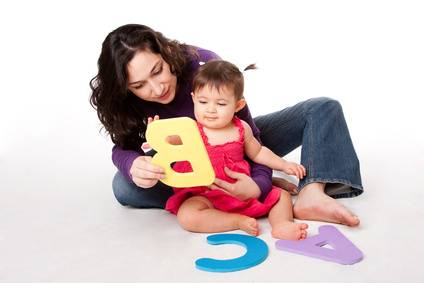Mom and nanny: each to her own!
Read this article published in the October 2012 issue of Infobébés – Infocrèche.
Entrusting your child to our care requires a great deal of trust and mutual respect between the professional and you, the mother. It’s a delicate balance, marked by intimacy. What can you do when this balance is upset and the relationship is faltering?
It’s 7:30 a.m.! With your comforter in your pocket, you set off with your little one through the still-dark city streets, in the direction of his day-care center. Confident or not? Some of you entrust your child with serenity. You’re confident in yourself, in your little one, and above all in the person who’s taking him in. You see this as an opportunity for you to carry on your professional activity, and for your child to enjoy new experiences outside the family circle. For other moms, it’s not quite so simple. And entrusting your child with your care can be a reluctant decision. Regularly, you regret leaving on the way to work, where you spend more time with your boss than with your little one. And above all, you don’t fully trust the professional who’s taking care of your little one…
Passing on the baton: a tall order!
You’re worried that this professional won’t be attentive enough to your child’s needs, and that he or she will be exposed to the worst dangers. » It’s the second time this week that I’ve had my Lola back, all dishevelled, with a dirty mouth and stained clothes! I’m seriously beginning to doubt the goodwill of the auxiliaries! « worries Clémence, mother of Lola and Bastian, aged 2 and 4. Worried, you sometimes make a thousand and one recommendations to the professional during morning transmissions, and subject her to a veritable interrogation during evening transmissions: has he eaten well? slept well? played well? It’s enough to confuse anyone! Your ideal? That, in your absence, the professional(s) take good care of your little one. But at the same time, you’re worried that your « replacement » will take over your little one’s heart, so much so that he’ll end up preferring her! A bit contradictory, don’t you think? Some of you express this fear by lingering over the morning kisses at the moment of separation. Similarly, if your child, immersed in his play, doesn’t jump into your arms as soon as you arrive, you’re worried that he’ll feel better at home than with her.
You’re the mom, she’s the pro!
Taratata! Don’t forget that you’re still his mother, his first and greatest love. And what binds you together is stronger than anything good or bad he may experience during the day with women other than you. You may be physically absent, but you’re still present in his little head. As a mother, you know your little one better than anyone else, know what’s good for him, and know the ropes when it comes to raising him. The professional, on the other hand, is there to take over from you when you express the need. And her role is complementary to yours. On the one hand, she expresses to your own child a very intimate part of herself, namely her maternal instinct, and naturally takes a liking to your child. On the other hand, she is a professional, and caring for children is her job. In this sense, your relationship with her is unique: you’re paying her for a service, while entrusting her with the flesh of your flesh. Most pros strive to cultivate this emotional closeness with the child, while respecting the legitimacy of the parents. Unfortunately, staying in one’s place is not easy, either for you, the mother, or for her, the professional.
When the relationship gets out of hand…
Ouch, ouch, ouch! For some time now, you’ve been feeling that the relationship between you and your deputy is on the rocks. To the point where transmission times are punctuated by unspoken words and biting remarks: « Your little Sophie looks tired again this morning… What time did you put her to bed this time? » an auxiliary tells you suspiciously. « Don’t forget to put his bonnet on when he plays outside, because I don’t want him to get sick again! » you say nervously. The reason for these little conflicts? Both of you are close to this little being, and both of you think you offer him the best. » When you spend nine hours a day with children, it’s very difficult not to become attached to them. We sometimes see them more than their parents! As a result, we’re sometimes reluctant to reproach them, » says Sandra, an assistant in a day nursery. The situation becomes even more complicated when the childminder works alone in her own home. The absence of a team and neutral premises makes it harder to take a step back, to the point where emotional competition can arise. » It was at my side that Lina took her first steps, and her first tooth was born. She even said « Tata » before she said « Mom » or « Dad »! So I’m very proud. enthuses Claude, a childminder looking after two children. The risk? That the professional ends up taking too much ownership of your child, to the point of overstepping her role, becoming intrusive and even criticizing your educational choices. But you too, as a parent, are likely to cross the boundary of intimacy. » I’ve seen it all: the parent who asks me to make him a cup of coffee when he arrives in the morning, the one who confides in me about his relationship problems, the one who takes the liberty of criticizing my own children’s upbringing or even judging the decor of my apartment! » testifies Marie-Hélène, a childminder looking after three children. This misunderstanding between you and your childminder can build up over time.
How to react?
Stop right there! It’s time to clean up this relationship and regain some serenity. You don’t want to have to choose another home for your loulou and deprive him of the people to whom he is very attached. As in a couple’s relationship, you’ll have to learn or relearn how to communicate. If you’re working with a childminder, ask her to review your child’s care, either at her home or outside, at a time when the child won’t be present. Never bring up this type of discussion at the bottom of the door at transmission time. If one or more auxiliaries are involved, suggest that they meet in the presence of a third party mediator, i.e. the section’s educator or the facility’s director. When the time comes, lay your cards on the table: « I’ll be honest with you: for some time now, I’ve been sensing a certain unease between us, an unease which I think affects you as much as it does me. For Laurie’s sake, I’d like us to talk about it ». And suggest that together we look at the situations that seemed conflictual: « Last Monday, when I asked you to wake Margot up exceptionally before the end of her nap, you sighed, rolling your eyes… ». Beyond this interview, it’s a question of regaining confidence in the childcare environment. To do this, even if you’re no longer adapting to the new environment, ask if it would be possible for you to spend a few hours with your child in the nursery or in the childminder’s living room, to familiarize yourself with the atmosphere of the place, the rhythm of the day and the relationship that the professional(s) have with your little one.
A good understanding between you and your deputy is therefore essential for the well-being of your loulou. It’s time to set a good example! Encouraging your little one to blossom in his place of care means, above all, giving him a taste for independence and encouraging him to make the most of his life as a little man. In short, it’s a dynamic that will enable him to explore the road to school with serenity.
She was everything to me and I was everything to her!
« For almost three years, the same childminder looked after my little Sonia, 10 and a half hours a day. They were very close to each other. I couldn’t stand their complicity, and made sure to point it out to her. Indeed, when she left for school, Sonia and her auntie were torn apart! Fortunately, Dad had reasoned with me and dissuaded me from changing childminders.
Chantal, mother of Sonia, aged 4 and a half (41).
And what about the child?
The educational and emotional harmony between parents and childcare professionals will help the child to enjoy the childcare experience, and to attend with a lighter heart. Conversely, conflicts can affect them to the point where they refuse to go. Make no mistake, a child may not be able to understand all adult exchanges, but he will feel the pressure and aggression.
Group nurseries: a lack of flexibility and individuality
« Conflicts specific to nurseries can be observed, due to the weight of the community. Parents have little flexibility and must accept a certain formatting, to the point where original parents can be unappreciated. There is little room for individuality. In addition, arrival and departure times are very precise and imperative. Finally, the teams can impose themselves as specialists who know what’s good for the child, to the detriment of the parent ».
Laurence Rameau, nursery nurse and editorial director of Journal des professionnels de la petite enfance.
I was dreading the team’s transmissions
« There was a time when Mathieu, my youngest child, used to bite the other children in the nursery. As a result, every evening, when it was time to pass on the baton, I got increasingly nasty comments from the team. The auxiliaries probably thought I was taking the problem lightly, whereas deep down I was really worried… Looking back, I think I should have suggested that they get to the bottom of it and talk it over with a clear head ».
Clotilde, mother of Mathieu and Fanny, aged 1 and 4 (13).

